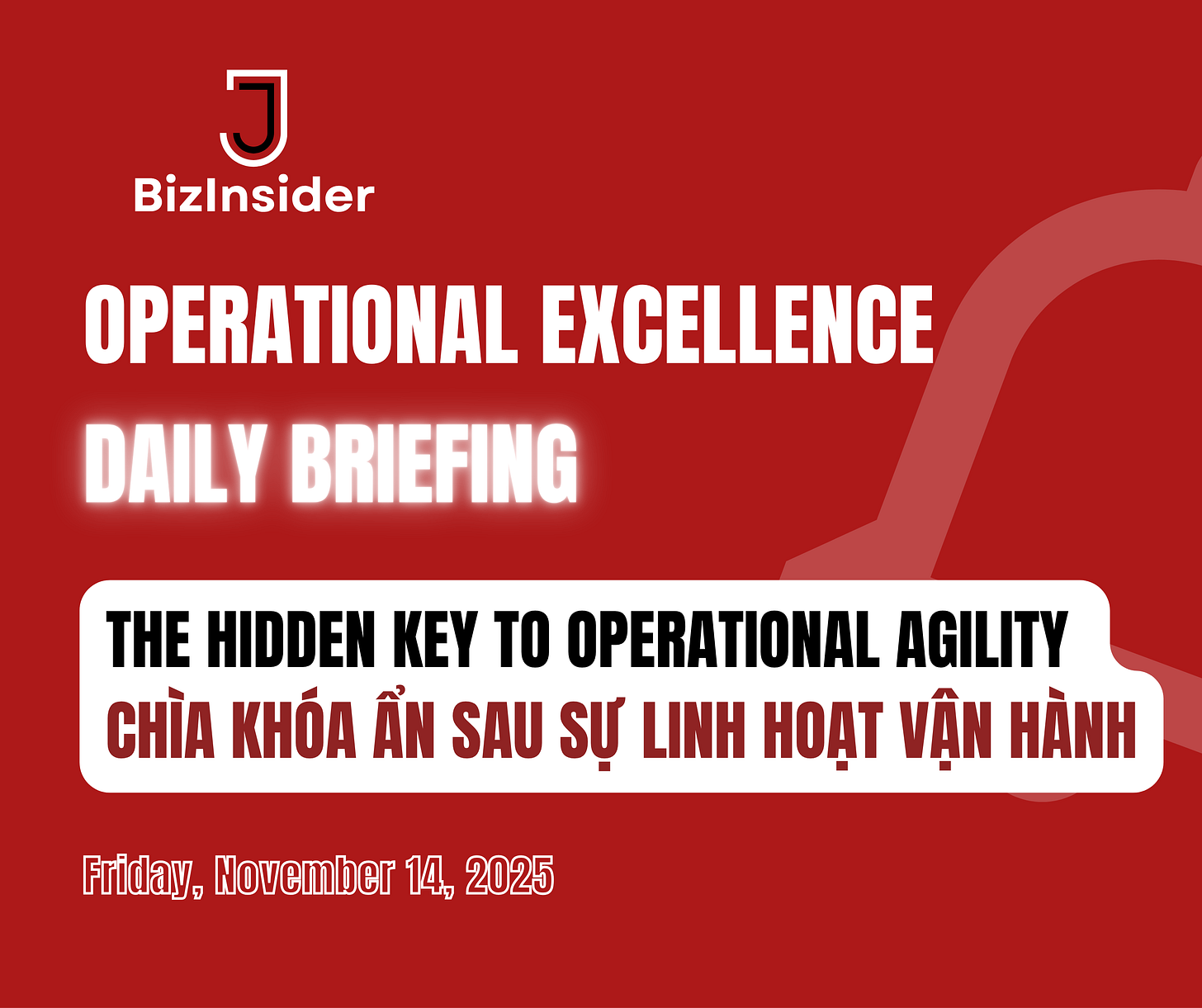Operational Excellence (OPEX) Daily Briefing – Friday, November 14, 2025: The Hidden Key to Operational Agility.
Điểm Tin Operational Excellence (OPEX) Mỗi Ngày – Thứ Sáu, Ngày 14/11/2025: Chìa Khóa Ẩn Sau Sự Linh Hoạt Vận Hành.
Welcome to my unique weekday article for the paid subscriber-only edition.
Operational Excellence (OPEX) Daily Briefing – issued on weekdays (Monday to Friday).
Điểm tin Operational Excellence (OPEX) hằng ngày (phát hành các ngày thứ Hai đến thứ Sáu).
This is the bilingual post in English and Vietnamese. Vietnamese is below.
Đây là bài viết song ngữ Anh-Việt. Tiếng Việt ở bên dưới.
English
Part 1: Official Statement
On November 14, 2025, Supply Chain Digital released a weekly summary of key operational trends, revealing a clear shift in how global enterprises approach supply chain management. Whereas the previous focus centered mainly on optimizing processes and cost reduction, companies are now expanding toward strengthening domestic resilience combined with AI-driven operations—ensuring their systems not only perform well under normal conditions but also remain stable when disruptions occur.
What is notable is that this shift does not dismiss the role of Operational Excellence (OPEX). On the contrary, it shows that OPEX is the foundation enabling businesses to move into a more holistic operational stage—one in which optimization, standardization, data, and adaptability merge into a unified system. Organizations that succeed operationally are not necessarily the ones that run the fastest, but the ones capable of maintaining speed even amid volatility.
Numerous reports from operational research organizations such as OECD, CELLO Square, and DP World emphasize three factors that form a strong operating system: process efficiency, cost–quality balance, and resilience against risks. These three factors do not exclude one another; they reinforce each other and all reside within the structure of modern OPEX. This demonstrates that OPEX is far from outdated—it is becoming the backbone that allows organizations to integrate new layers of capability, especially as globalization enters a period of heightened uncertainty.
The rise of the “domestic resilience + AI operations” trend is a direct result of disruptions in recent years: logistics congestion, rising transportation costs, geopolitical supply chain interruptions, climate change, and material shortages. These forces have compelled companies to view operations through a new lens: not only optimizing for normal conditions, but building the capability to operate stably under abnormal conditions.
That is why the November 14 bulletin highlighted two themes: the return of domestic operational strategies to reduce dependency, and the rise of AI as a structural tool in operations—not limited to basic automation. AI is no longer confined to isolated applications; it is beginning to serve predictive analytics, early warning, and real-time decision support—aligned with the modern OPEX approach, where data becomes the foundation of intelligent operations.
From an OPEX perspective, this is not a change in direction but a natural evolution. Traditional Lean focused on reducing waste in physical workflows; in digital Lean, organizations begin reducing waste in data flows. From improving processes, companies move toward improving systems. From measuring time, they progress toward predicting risks. This expansion helps OPEX remain central to operational strategy rather than becoming a set of tools for “local optimization.”
Operational reports from November 2025 indicate that companies are shifting from “optimizing locally” to “optimizing system-wide.” They are building more flexible supply networks, deepening data integration, automating repetitive activities, and leveraging AI to support faster, more accurate, evidence-based decisions. This is not merely a new trend but a sign of a new operational generation—one in which OPEX not only enhances performance but strengthens stability, transparency, and adaptability.
In this context, understanding and applying modern OPEX enables businesses not only to improve efficiency but to build an operating system capable of withstanding change—an essential capability in today’s global operating environment.




